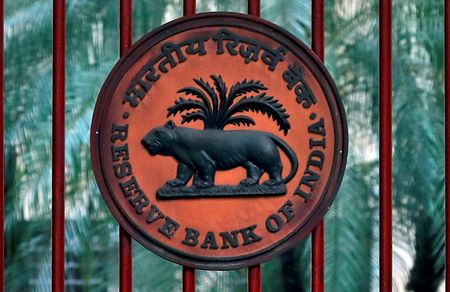By Anushka Trivedi
MUMBAI (Reuters) -The Reserve Bank of India may have to resort to tried and tested measures to shore up its foreign exchange reserves, including encouraging non-resident Indians to deposit more funds, as it looks to stabilise a steadily declining rupee, economists said.
The Indian currency has weakened 9.5% so far this year, with the central bank defending the rupee via dollar sales that depleted its forex reserves to $545 billion from the peak $642 billion a year ago.
“The central bank should intervene to ensure that a falling currency does not eclipse India’s fundamentals,” Abheek Barua, chief economist at HDFC Bank, wrote in a note this week.
While there might be some benefits of a depreciated currency in closing the trade gap, the damage to the capital account in terms of reduced confidence of investors will outweigh it, he added.
According to Barua, the central bank may need to think of ways to bulk up its forex reserves, should the pool shrink to near $500 billion in the coming months.
“More capital is needed at this stage to stabilise the rupee and enable the RBI to replenish its reserves chest,” he said.
Japanese investment house Nomura said in a note that Asian central banks and governments have in the past relied on certain measures to shore up foreign exchange reserves and may need to reconsider these as a second line of defence.
In India’s case, the RBI had previously tried to halt the pace of capital outflows, ease norms around external commercial borrowings and introduce non-resident deposit schemes, among others, which could be useful to help with currency depreciation pressures, Nomura added.
In July, the RBI had allowed banks to raise foreign currency non-resident deposits at higher costs and permitted foreign investors to buy shorter term local debt as a way to encourage more inflows.
Those measures have only helped marginally, analysts said.
The central bank should explore other options such as those in 2013 when the rupee came under pressure due to the U.S. Federal Reserve announcing plans to taper bond purchases.
It may be time to think yet again of the taper tantrum playbook, subsidize forwards and get lumpy non-resident deposits in, Barua said.
“NRIs are sensitive to India’s robust fundamentals and could be persuaded to deposit their dollars … at attractive rates,” he added.
(Reporting by Anushka Trivedi in Mumbai)





